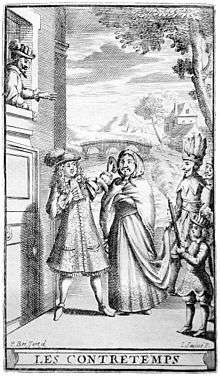L'Étourdi ou les Contretemps
| L'Étourdi ou les Contretemps | |
|---|---|
 Frontispiece from a 1682 edition | |
| Written by | Molière |
| Date premiered | 1655[lower-alpha 1] |
| Place premiered | Lyon |
| Original language | French |
| Genre | Comedy |
| Setting | Messina, Sicily |
L’Étourdi ou les Contretemps (The Blunderer, or the Counterplots), also known in English as The Bungler,[lower-alpha 2] is a five-act theatrical comedy by the French playwright Molière. After premiering in Lyon in 1655,[2][lower-alpha 1] it appeared at the Théâtre du Petit-Bourbon in Paris in November 1658.[3]
Plot
Lélie, a young nobleman, falls in love with Célie, a gypsy girl held captive by Trufaldin. Lélie's servant Mascarille plots repeatedly to bring Lélie and Célie together, but Lélie defeats every scheme with his inept bungling.
History
Molière was inspired by an Italian play, L'Inavvertito by Niccolò Barbieri, which had been published in 1629.[2][4] The main character of that play, a servant called Scapino, was the inspiration for the character Mascarille, and many elements of the plot are similar.[2] Molière played the role of Mascarille when his company performed the play.[5]
Adaptations
Sir Martin Mar-all, a 1667 play by the English writer John Dryden, was based on a translation of L'Étourdi.[6]
Notes
References
- ↑ Scott 2002, pp. 79-80
- 1 2 3 Wadsworth 1987, p. 27
- ↑ Gaines 2002, p. xiii
- ↑ Gaines 2002, p. 174
- ↑ Wadsworth 1987, p. 32
- ↑ Gaines 2002, p. 189
Works cited
- Gaines, James F., ed. (2002). The Molière Encyclopedia. Westport, Connecticut: Greenwood Press. ISBN 0-313-31255-9.
- Scott, Virginia (2002). Molière: A Theatrical Life. Cambridge: Cambridge University Press. ISBN 0-521-78281-3.
- Wadsworth, Philip A. (1987) [1977]. Moliere and the Italian Theatrical Tradition. Birmingham, Alabama: Summa Publications. ISBN 0-917786-04-1.
External links
- L’Étourdi at Project Gutenberg (in French)
- The Blunderer at Project Gutenberg (in English)